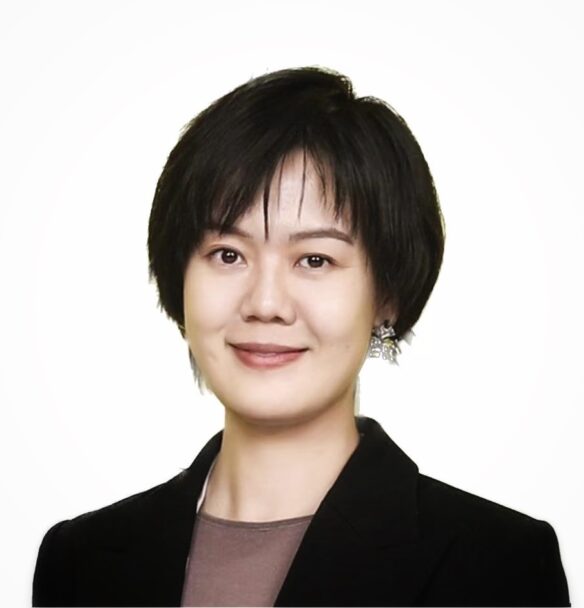
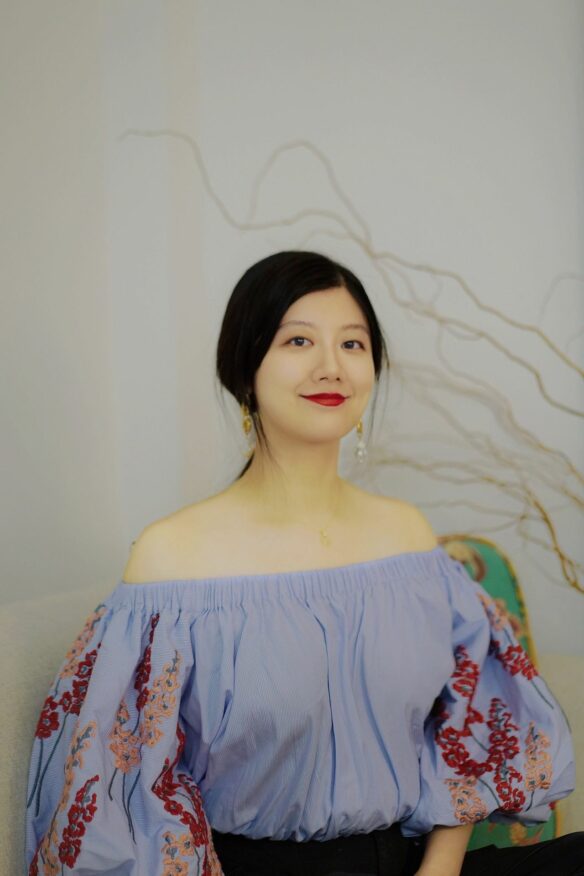
INTRODUCTION: Eight Light Minutes(8LM) Culture of Chengdu has given permission for File 770 to reprint the series of interviews with Chinese science fiction writers which they have been running this week on Facebook. The fifth in the series is a question and answer session with Gu Shi, author of 2024 Hugo-finalist novelette “Introduction To 2181 Overture, Second Edition”, and Emily Xueni Jin, who translated it to English for publication in Clarkesworld.
SUPPORTING CHINESE WRITERS SERIES: 2024 HUGO AWARD NOMINATION INTERVIEW WITH GU SHI AND EMILY JIN
Translated by Joseph Brant.
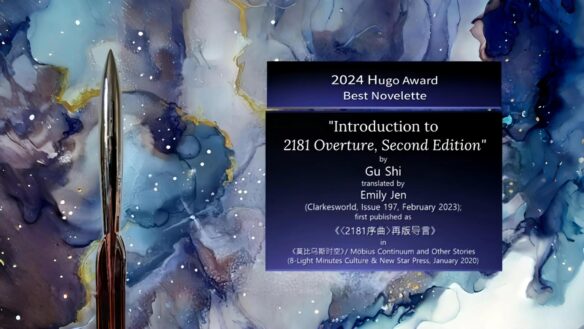
Part 1
- “I had a responsibility to write about the women I meet.”

Gu Shi is a Science Fiction writer, a senior urban planner, and a member of the Chinese Writers’ Association. She has published more than 300,000 words of sci-fi in magazines such as Science Fiction World, Beijing Literature, and Shanghai Literature since 2011, as well as in her own collection, Möbius Time and Space. She has won several major awards, including the China’s Galaxy Award, the Chinese Science Fiction Nebula Award, the Science Fiction Planet Award for Literature, and the Fishing Fortress Science Fiction Award. Her work “Introduction To 2181 Overture, Second Edition” is shortlisted for the 2024 Hugo Award for Best Novelette. Much of her work has been translated into English, Italian, German, Spanish, Japanese, Korean, and Russian, among other languages.
Q1|Hello, Ms. Gu Shi, first of all, I would like to congratulate you on the shortlisting of “2181 Overture” for the 2024 Hugo Award for Best Short Story. Some readers may not have read this work, so could you please give us a brief introduction to this piece?
Gu Shi: Do you find the full title “Introduction To 2181 Overture, Second Edition” interesting? It has several layers — “2181” sets the story in the future, “Overture”, suggests the story takes place before the future, and “Introduction” and “Second Edition “, shows that it uses a non-fiction style for a non-fiction book. Using this non-fiction style allows me to create a “pseudo-preface” to a book that doesn’t exist. The pseudo-preface condenses six stories, with 16 different characters, and ties it all together with a common trope of science fiction: Cryogenic technology. In this story, I try to explore how far the idea of “hibernation” may go, and I ask a lot of questions about it: if Cryogenics could be realised, what kind of legal issues would its application bring? How would it change our way of life and the thoughts of humanity? Would it create new illustrious billionaires? Would those unable to catch up with the technologic advances become the “left-behinds”? Will people accept cryogenics when it comes to deep space exploration? After answering these questions with five “documentary” stories, Dong Lu, the “author” of the introduction, finally reveals that she is the mother of the book’s “author”, Fang Miao, and explains the background of the creation of the “book”: Fang Miao developed cancer when she was studying at university, and cryogenic technology was her way of cheating in the race against death. The scientist who perfected the freezing was none other than her own mother, Dong Lu. The story originally debuted in 2020 in my collection Möbius Time and Space, and was translated into English by Emily Jin, and published in Clarkesworld Magazine in 2023. It is that English version of the story that was shortlisted for this year’s Hugo Award.
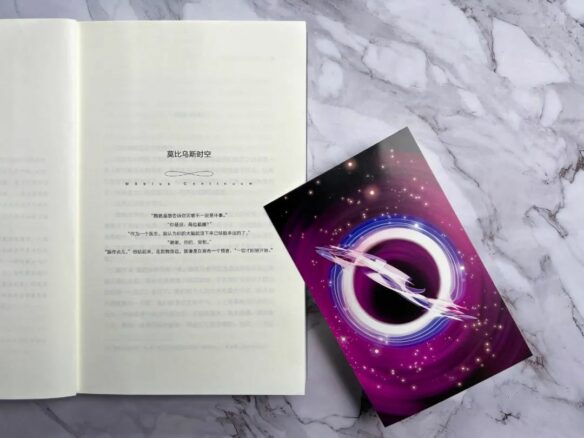
Q2|In the “Introduction To 2181 Overture, Second Edition”, all 16 characters are women, which is quite unique, and in your upcoming collection, titled 2181 Overture, almost all the stories are told from a female perspective. What is it that drives you to write in this way?
Gu Shi: Until 2018, most of the Sci-fi I wrote had male protagonists, but in my newer work, I’ve almost exclusively used women. The thing that made me change was translation. In 2017, when my work started to reach an international arena, Readers began to ask me “Why are all your protagonists male? Why don’t they feature China?”. These questions made me think about how I, a Chinese Female writer, could better reflect my life experiences, unique from foreign writers, and was surprised to find that the brilliant, positive, calm, and intelligent women present in my everyday life were almost invisible in both Western and Chinese Science Fiction. I had a responsibility to write about the women I meet. In the “Introduction To 2181 Overture”, The women are scientists, businesspeople, lawyers… They could be the ones who take on the responsibilities of their families, or the ones who abandon their families to become the forerunners of interplanetary travel.
Q3|So how do you define “Women’s Sci-fi”?
Gu Shi: I have resisted that concept of “Women’s Sci-fi”, or of “Female Writer”. If there’s such a thing of “Women’s Sci-fi”, why not “Men’s Sci-fi”. Once you single out a gender as a label, it’s as if you are naturally placing it in a lesser position, though in the past few years I’ve realised that it’s not gender per se that I’m resisting, but the gender stereotyping that comes with “Women Writers” and “Women’s Writing”.
What is it we expect when we open a volume of “Women’s Science Fiction”? A more emotional perspective? A more literary tone? Or maybe just a more domestic setting?
Women’s Sci-fi isn’t there to prove that women can write as well as a male writer, just as Chinese Sci-fi isn’t there to prove we can write as well as a Colombian (or any other Country’s authors). What makes Women’s science fiction unique is the writer’s ability to confront the future through speculative fiction. The process lets the writer confront the dilemmas they face or imagine more egalitarian views of gender in a possible, positive future, and that second route is the one I’m taking.
Q4|Your early works, published in things like Super Nice Magazine were very standard genre stories, very fast paced, with twist endings, whilst more recent works, like “Choosing The City”, “Introduction To 2181 Overture” and “Magic Mirror Algorithm” are more literary, with deeper explorations of social issues, such as the aging population, and city planning. What led to this change in style?
Gu Shi: First of all, It’s really about selecting the topic and style that match the publication. Super Nice is very genre-based, and the Editors’ notes to me were very effective, but now, I have access to a much wider range of platforms and magazines, so I can experiment with different styles and subjects, and submit them to the most suitable outlets. I’ve always been interested in the subject of aging, because associated topics kept making their way into my early work, like The Memory Of Time, where a male celebrity relied on virtual reality recordings to relive his past experiences as he grew old and infirm.
Other topics, I had wanted to approach earlier, but it’s only recently that I gained editorial control and could decide to write about urban planning and construction in “Choosing The City”, which is a little like doing a thematic study of my day job, so was actually a very difficult writing process. Fiction is more of a hobby for me, so I hope to always try new things, and explore more challenging content, in both the subject and technique, as well as the style.
When I finished “Introduction To 2181 Overture”, I hit a block, and found it hard to start a new genre piece that would surpass anything I’d already written. This coincided with an opportunity to read through a lot of purely literary fiction from the past few years, and from them, I learned a great deal of literary possibilities I hadn’t previously been aware of.

Q5 | “Introduction To 2181 Overture” focuses on cryogenic hibernation. There are many sci-fi novels depicting cryogenics, but most of them focus on the sleepers, while this story has the alternative focus of those who do not hibernate, who cannot cross the seas of time, and who are left behind. If the technology of cryogenics is actually realised one day, would you be willing to try it? Or would it feel like an escape from reality?
Gu Shi: We’re all strive for ideals, innovation and efficiency, but sometimes we have to admit that some people, even if they are working to exhaustion, are going to get left behind by the future. The origin of the concept of “left behind” is closely associated with “leftover”, specifically “leftover women”, and when I was labeled as such, I was shocked to look at exactly where it was I had been left behind, and whether it was really necessary for me to try to ‘catch up’ with the others, but ultimately I decided I wanted to live my life at my own pace, and I wish everyone had the courage to do the same. If cryogenics was actually realised one day…… I don’t think I’d feel compelled to try it. Our reality is something that needs to be faced head on, and running away from it doesn’t help. Whilst I’m not sure I would try for my own sake, if I was “summoned” by a someone like “Man Ge” from the story… I think I would.
Q6|Throughout your years as a science fiction writer, which stories have you been most satisfied with?
Gu Shi: So hard to choose! “Chimeras”, “Introduction To 2181 Overture” and “Mothership” are all works I’m very happy with, but If I had to choose just one that I’m most pleased with, out of all the stories I’ve published, I would have probably say “Magic Mirror Algorithm”. When I was writing it, I tried so hard to put aside all the technical skills I’d already honed, and just let the characters, plot, and sincerity drive the story, and I loved the final result. If you include the unpublished work too, it’s probably a fantasy novella I wrote in middle school called “The Godkiller”. It was a very indulgent story that I wrote without restraint. I happened to be chatting to Ken Liu at the time, and he said that when he signed books for his readers, he always added “May you get to tell the story you want to tell, always”. Even as I started writing “Godkiller”, I knew it was not the story I wanted to write for any publisher, but it was exactly the story I wanted to write for me. I’m glad I finished it, and I look forward to hearing what readers think of it.
Q7|I hear you are currently working on a full length science fiction novel. What do you think is the main difficulty in transitioning from a short story to a full-length one?
Gu Shi: Long and short form fiction have such different requirements for their authors, from the state of mind, the technical skills to the rhythm and pacing. They all need to be fine tuned. Perhaps it’s most like the difference between a marathon and a sprint. When I first started writing, it was online romance novels, all long form. I mean, not compared to what we see online these days, which can be 100,000 to 200,000 characters, but still, I’ve always considered myself a long form writer, and the greatest pleasures I’ve found in writing, are the ensemble scene plotting, the character arcs, and the sense of fatalism, which can only really be explored in longer stories. I’ve been working on longer pieces for the last few years, but various things have meant I’ve had to stop half way through, sealing up projects of 100,000 characters. If you look at the difficulties faced, on one hand it is that investment of time and energy, but on the other, It’s my own desire to finish a story, that I’ve developed further with short story writing. Short stories can be brought to a high level of completed state with a sufficient number of revisions, but with novels… I often kept changing them as I write, and once they were half way done, I gave up.
Q8|Please say a few words to the Sci-fi fans who are currently considering the Hugo Awards
Gu Shi: I’m very happy that “Introduction To 2181 Overture, Second Edition” has been shortlisted for the Hugo Awards. A few months ago, the Hugo committee sent out reading packs of the shortlisted works, and the best thing for me about this whole process is that all the sci-fi fans preparing to attend Worldcon in Glasgow will be able to read this story in those packs. I believe Science Fiction is a bridge that can span this messy, fragmented reality, and connect us all with the future. I hope that Sci-fi will also help all its fans define their own futures.
Part 2
- “I see fragments of myself, and my own potential future in them.”

Emily Xueni Jin is a PhD student in the Department of East Asian Languages and Literature at Yale University. As a young student, she translates from both English-to-Chinese, and Chinese-to-English, and her works include The Search for Philip K. Dick, the Kingdom Of Clockwork series, and Chlorine. Her translations have appeared in Clarkesworld and other genre fiction publications, as well as the first collection of Chinese sci-fi and fantasy written and translated by female and non-binary writers, The Way Spring Arrives and Other Stories, AI2041, jointly written by Chen Qiufan and Dr Kaifu Li and Liu Cixin’s anthology A View From The Stars.
Q1|Hello Ms Jin, you’re the translator of the English version of “Introduction To 2181 Overture”. What are your thoughts on this story?
Emily Xueni Jin: It’s hard for me to talk lightly about “2181 Overture” just as a story, because it is clearly a magnificent epic of women’s future. Gu Shi, who I know is a big fan of operas and musicals, will probably get this: reading this story is like sitting dead centre in the middle of a great ancient amphitheatre, where centuries rush by, and countless female voices form this…a sublime Greek Chorus, each singing softly or richly their own part, using their voice to write their unique personal chapter. Everyone is independent and vivid, but in the end, they converge into this symphony of colourful intertwining, telling the destiny of all women.
As a translator, the experience of bringing this story into English was definitely very special. It was like… traveling through an “instantaneous multiverse” singing all the parts for each of the women on the page, subtlety transposing the Chinese scales to an English one, with the same rhythm and cadence working in this very different language system, and ways of emphasising the words. Most importantly, each voice has its own personality and narrative style, which I had to present in English. I needed to empathise with each of them, recreating those individuals in English, but also constantly keeping my mind turned to the macroscopic structure, and the overall narrator that dominates the story, a scientist who is writing a scholarly work on a period of history, meaning that I too had to detach myself from these individuals at the right time, so I could, like the author, become a master of the story world.
The story’s uniqueness, for me, really comes from its three-stranded intertwining structure. As the translator, I have to really sync with the author. As the narrative perspective switches, I need to attune to each new voice. As a woman, I am part of the history of each of the millions of women from this future, in each of whom I see fragments of myself, and my own potential future.
“Introduction To 2181 Overture, Second Edition” really provides a new paradigm for the future of women’s sci-fi. It’s not necessarily emphasising gender specificity throughout, but it’s certainly integrating gender perspectives throughout, in its settings, in every line. What’s female is human, that’s all.
Q2|In previous interviews, you’ve shown a great interest in Chinese science fiction. When you translate these works, how do you break those cultural barriers so that English readers can better appreciate the charm of Chinese sci-fi?
Emily Xueni Jin: For me, I really started just to challenge myself, and to challenge that innate orientalist stereotyping caused by a colonialist mindset. It’s frustrating that without an in-depth understanding of the base culture, it’s so easy for a Chinese story translated into English to just become a dose of orientalism. Or the Chinese elements to be reduced to decorative elements to attract attention, which shifts the reader away from their presence in the story itself. So, I have to remain very conscious of the fact I need to counterbalance that, and I’m very particular in the words I use in my translation. Compared to sci-fi based on the familiar, and near-future settings, it’s definitely more demanding to translate a story that references traditional culture, mythology, and history, because I don’t have that set of English commonplaces I can just ‘plug and play’. I have to build my translations on the fact that an English reader will have no concept of these elements, so I put a lot of effort into researching them, and sometimes almost ‘reverse engineer’ the reference material for that concept of culture, independent of the story.
Moving forward, we’re only going to see more science fiction growing out of Eastern traditions, and as someone in a fortunate position of being able to navigate both cultures, The work I’m doing now to slowly build up that body of references, will make it easier for future translators moving forwards. It’s just starting to lay the groundwork, I suppose.
Q3|Apart from translating sci-fi stories, you’ve also translated titles like In Search of Philip K. Dick. Is there a big difference between translating fiction and non-fiction? What do you feel are the main differences?
Emily Xueni Jin: In general, translating non-fiction requires lot more cross-referencing, and the narratives tend to be more linear and straightforward. I try to suppress my personality, and remain objective. Sometimes, it’s like the process of preparing material for when I teach a class at university. The translator needs to have a good understanding of the content to be translated, and then explain that back to a reader using a completely different language. In Search of Philip K. Dick was not quite the same as other non-fiction. Being both a biography, and coming from Dick’s Ex-wife, Anne, it could be said that the book was a culmination of poetic narrative, private correspondence, and objective reporting. I needed to be able to switch between that passive voice (translated in a straightforward tone), discussing his life and work (with references, reviews, and an unexpected deep dive into Californian hippie culture), and a lyrical voice (aligning with Anne, and measuring my words against her thoughts and love language).
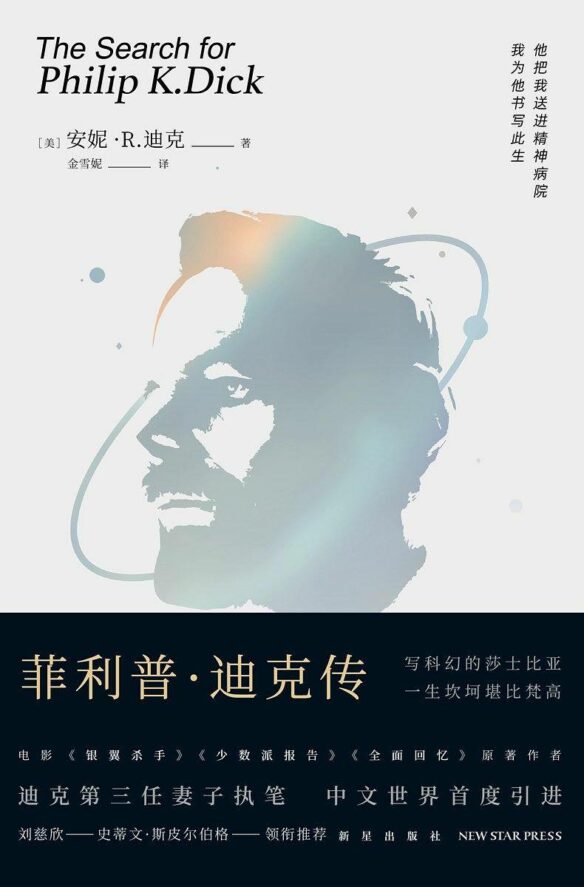
Q4|Besides Translating, do you have any plans to write your own works?
Emily Xueni Jin: Between the ages of about eight and my early 20s, I was really interested in creative writing, and quite prolific. I wrote a lot of Sci-fi and Fantasy stories, as well as fanfic. I was a dedicated user of AO3 and Lofter. When I was sixteen or so, I uploaded a full length YA novel I’d written when I was fourteen. It was a Sci-fi /Fantasy /Procedural drama, but since it was pretty mediocre, we just consider that a dark time that we don’t talk about. (It was still dug out by the sci-fi critic Sanfeng. His research skills are scary!)
At university, I started to write a long series with my own worldbuilding. It was a Seafaring /Steampunk/ Female led Fantasy story, but before I finished it, I found my interest in writing fading, and I found more enjoyment in translation, and academic writing, so I stowed it away. However, after the last couple of years, I feel I’m ready to return to my old ways, and with the encouragement of a couple of friends, I hope I can go back and finish the first volume. In the next year or so.
With that said, I want to address the relationship between translation and creativity. Honestly, I find most people have this notion that creative writing is just naturally superior to translation. Writers get all the accolades and respect, and if there’s a multilingual author who then goes on to translate, that’s just considered the icing on the cake, whilst a translator can put their entire talent to bringing work into the global sphere and be asked “Are you just doing this because you can’t write your own work?”. I’ve been asked that by more than one person, as though translation is a second class job. However, the reason I shifted my focus to translation, was I happened to read Ken Liu’s translation of Three Body Problem before graduating, and became interested in the art of translation, which appealed far more than mere writing. The ability to translate well was a remarkable skill to me. It’s a very different set of challenges, and whilst a translator with no creative experience could still produce an excellent translation, not every skilled writer will make a good translator.
As a writer turned translator, the greatest challenge I faced was letting go of my subjectivity. I had to avoid making every translation feel like my own voice, but instead, become as pliable as possible, soaking up the writer’s text like a sponge and then transform that into another language, even if my ‘authorial voice’ is constantly screaming from backlash during the process. For me, it’s the same sword in my hand, so writing is conquering and translating is protecting.
It’s true however, that the experiences to gain through translating can then be transferred back into creative writing. For example, when I’m translating, rather than just reading a piece, I’ll develop a much deeper understanding of the different author’s creative techniques, or approaches, as both a bystander, and an insider, in ways that then allow me to use them in my own writer’s toolbox. This bidirectionality lets me switch perspective far more easily when it comes to my own work. When I think about “How would I translate this piece”, I tend to see my own characteristics, strengths, and weaknesses. On the other hand, the mastery of words and consideration that’s developed over time from my author’s mindset also helps in the translation process. In the end, both avenues are about exploration of both oneself, and the frontiers of creativity.

Q5|There is a debate in the field of translation between those who feel the text must be preserved in the most faithful manner, whilst others see the translation as its own stand alone creation. Which of those best represents your viewpoint?
Emily Xueni Jin: On the D&D alignment chart, my translation are firmly in the “Chaotic Good” camp, meaning I’m faithful to the original text, but abstract in my approach. My definition of faithfulness does not stop at the level of each word, rather I use my own cultural understanding, and creative imagination to absorb the story as a whole, and release it in another language. As long as it’s true to the story that the author wants to tell, the emotions it induces, and the concepts it conveys are all intact. Then I think that it is reasonable to use any tool of translation to secure that. That’s why I feel it’s important to have a rapport with the author and develop a level of trust. Any translator, passed a certain threshold of lingual skill can produce a competent translation, but unless there is a real connection with the the author (If they are still with us), where the translation can be nurtured in this new language like a child, can the translation truly shine. Of course, it’s common that a translator may have a limited understanding of the original author’s text, and the power in that writing; and there are rare occasions when the translation is heralded as “better than the original”, and becomes very popular. This could be the product of the translator putting themselves above the work, displaying their skills and whilst it may be a good story, it may not be a good translation.
With each language and culture being based thousands of miles apart, and no correspondence being perfect, translating a piece word by word may not work well. For example, if you translate a Chinese word into English, strictly looking for some kind of English equivalent, that translation will probably only be about 60% accurate, but if you are flexible, and you add, subtract, reduce, and transpose your way around the original work, that accuracy is more likely to reach above 90%. With “2181 Overture”, Gu Shi asked for me by name, whilst I was trying my best to secure the role of translator. It was a two-way street. I was touched by her absolute trust and recognition. It felt like I’d met my soulmate.
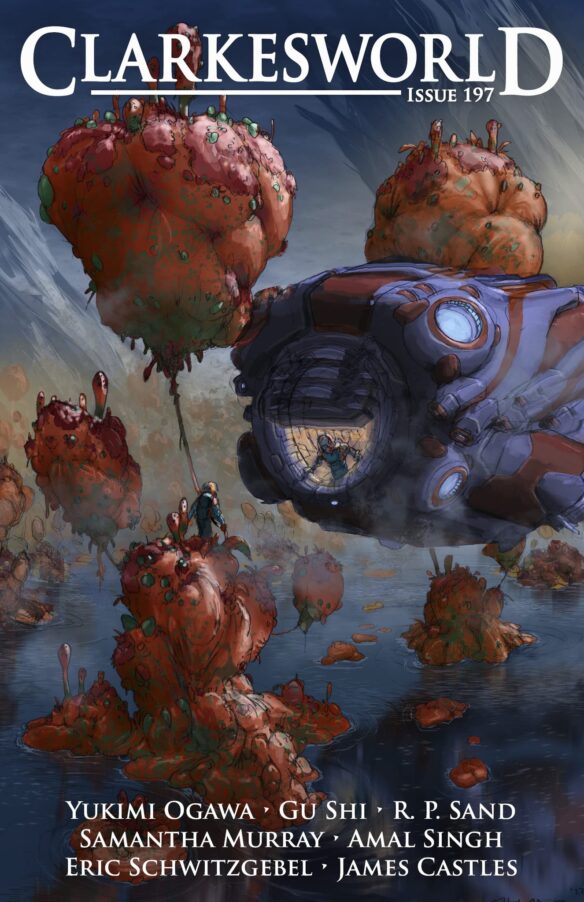
Q6|You’re currently studying for your doctorate in the US, and have access to the cutting edge of developments in Science Fiction. What state do you feel American sci-fi is in today?
Emily Xueni Jin: The Anglophone world has always had softer divisions between sci-fi and other Fantasy genres, as can be seen in the Hugo Award nominations through the years. On one hand, some fans think this has negatively affected the genre’s development, and we’re departing from “Golden Age” sci-fi, with its grand worldbuilding, and high tech settings, whilst others think it’s broadened the possibilities of fantasy, because, honestly, our relationship with technology is developing with the times, and with its ever-presence in our daily life, perhaps the focus should be on making life better, rather than creating a sense of wonder. In this way, both magic and technology become metaphors for human civilisation, and the future we want for it.
In contrast to the extremes of exploration it’s known for, the main focus of American Sci-fi seems to have shifted to introspection. More examination of the self, cultural identity, and private feelings, questioning and challenging the ingrained sci-fi aesthetic laid down by White male writers over the past 100 years. Despite many of the biggest hits being criticised for “Pandering to the Woke agenda”, I believe that, when viewed over a longer timescale, these explorations and attempts are similar to those made at every transitional period of a megatrend. Any form of representation and inclusion of diversity can only be a good thing, making Science Fiction more dynamic. Similar to American sci-fi, I feel maybe we have also reached the crossroads with Chinese sci-fi, where we are questioning the definition of sci-fi, and remoulding our “selves” in science fiction, not only do we need to consider China’s own Science Fiction tradition and goals, refer to the world, faithfulness to the self and an open mentality are both key parts of this process.
Q7|Please say a few words to the Sci-fi fans who are currently considering the Hugo Awards
Emily Xueni Jin: It is my great honour, and pleasure to put this beloved work before so many more readers, as a translator. I have to say, that the criteria for judging the excellence of Science Fiction is still being shaped predominantly by the Anglophone world, and European, and American pop culture, but in recent years, there have been numerous novels and stories from East Asia and Africa, as well as work by Northern Europeans, Native Americans, and so on, which have, between them, been broadening the definition of sci-fi, along with our own endeavours. Although it seems we still need to translate everything into English before they can reach the “World” stage, I hope that in time, we will see the furthermore decentralisation of Science Fiction.
The Hugo Awards are really an honour and recognition, but most importantly, its essential roles are entertaining and connecting. If more readers read this novelette and are moved by it, because of the nomination, then all the better. My motto is “since you’re already here”, happy reading!
Discover more from File 770
Subscribe to get the latest posts sent to your email.

Love these two interviews alot